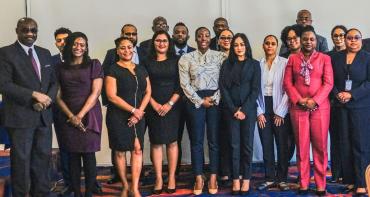Community actors in Malawi are set to benefit from a special training programme aimed at enhancing local skills in dialogue and dispute resolution.

Community actors in Malawi are set to benefit from a special training programme aimed at enhancing local skills in dialogue and dispute resolution.
The Commonwealth, in partnership with Malawi’s National Initiative for Civic Education (NICE), recently ran a three-day technical workshop targeted at peacebuilding stakeholders at the community level.
NICE requested the support in light of heightened tensions following the nation’s tripartite general elections in May.
Delegates from all 28 districts in Malawi converged in Lilongwe, including District Commissioners, community leaders and key members of the District Multi-Party Liaison Committees (DMLCs), National and District Peace Committees. Police and civic education officers also took part.
The event examined the social, political and economic context of recent tensions, and discussed how to strengthen local dialogue.
Participants also reflected on the opportunities and challenges of having an integrated system for preventing conflict, which focuses on the entire electoral cycle.
They also tackled the impact of new media and technologies in fuelling violent actions at alarming speed. The need for cohesion and effective linkages between national and local mechanisms for dialogue, peacebuilding, early warning and response was strongly emphasised.
NICE Board Trustee, Kent Mphepo said: “Since the result of the tripartite elections were announced in May 2019, Malawi has witnessed violent protest which is causing anxiety among many Malawians and those who wish the country well.
“The Commonwealth’s technical assistance to Malawi is coming at a very crucial time when national dialogue and collective responsibility for peaceful co-existence are needed to prevent further escalation.”
He called on delegates to deploy the skills acquired from the workshop “towards the patriotic duty of diffusing the current wave of political tensions in their respective constituencies and communities”.
Director for Civil & Political Rights, Malawi Human Rights Commission, Peter Chisi added that protests and disturbances have “impacted negatively on civil liberties and the economy of Malawi”, and commended the Commonwealth’s technical support to address the issues.
Representing the Commonwealth Secretariat, programme officer Abubakar Abdullahi said: “Dialogue and peacebuilding are at the heart of the support the Secretariat provides across the Commonwealth through preventive diplomacy, election observation and the strengthening of human rights, tolerance, justice, rule of law and good governance”.
He reaffirmed the Commonwealth Secretary-General’s support for “home-grown initiatives geared towards enhancing peaceful co-existence, social cohesion, political stability and democratic consolidation in Malawi”.
Head of the EU Delegation in Malawi Sandra Paeson, welcomed the Commonwealth’s support for NICE, adding that current political tensions can be de-escalated through “inclusive dialogue and local solutions encompassing all stakeholders”.
NICE National Programme Manager Gray Kalindekafe said plans were underway for dialogue and peacebuilding engagements in 11 “flashpoint” districts in the country.
In 2018, Commonwealth Heads agreed the importance of strengthening the Secretary-General’s Good Offices and its capacity to support national requests for peace building to enable sustainable peace and security, through the establishment and strengthening of national peace and dialogue processes.
In this regard, the Commonwealth Secretary-General remains committed to supporting Malawi’s efforts to strengthen its national mechanisms for meaningful dialogue.



